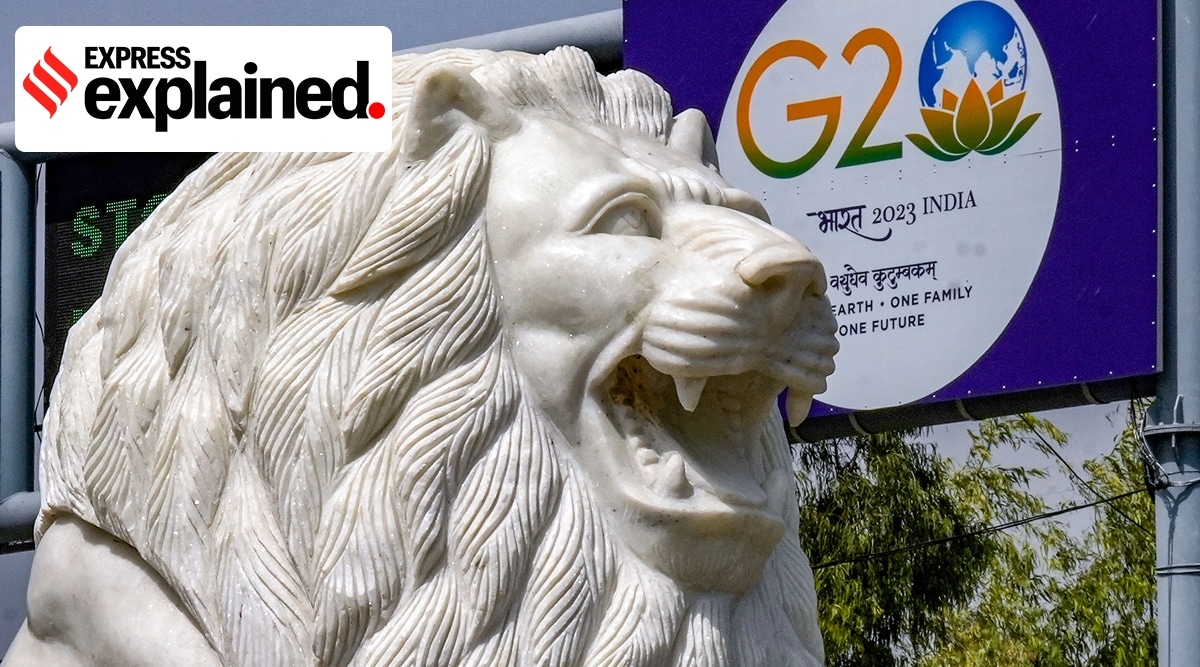North-South divide, and G20 as a forum which gave voice to the Global South
The primary reason for the G20’s ever increasing importance is that it is perhaps one of the few international fora which reflects the realities of today’s multi-polar world order.
 The G20 is one of the few international fora where North and South countries are members with equal status. (PTI Photo/Kamal Singh)
The G20 is one of the few international fora where North and South countries are members with equal status. (PTI Photo/Kamal Singh) The G20 leaders’ summit will be held in New Delhi on September 9-10. The 18th iteration of the summit cap India’s year-long presidency of the G20, at the end of which a G20 Leaders’ Declaration will be adopted.
In the lead-up to the summit, the Indian government, and Prime Minister Narendra Modi himself, have repeatedly invoked the term ‘Global South’. Earlier this year, at the G20 Development Ministers’ meeting in Varanasi, the Prime Minister said that “development is a core issue for the Global South”.
The North-South divide
The term ‘Global South’, in conjunction with ‘Global North’, was first used in 1967 by the American academic Carl Oglesby to refer to the “centuries of dominance” that some countries (the North) have exercised over others (the South). It became much more popular by the turn of the century.
Today, this categorisation is ubiquitous in international development and political discourse. While traditionally powerful, industrialised nations are seen as the ‘Global North’, the ‘Global South’ refers to nations further behind in their development journeys.
The South — which is not the same as the geographical south, or the southern hemisphere — includes countries in Africa, Asia, Latin America, and Oceania (sans Australia and New Zealand) whereas the North includes countries of Europe, the United States, Canada and Australia-New Zealand.
Notably, the North still shares hierarchical relations with the South in the international order, which is perhaps the best reflected in the make-up and workings of international forums and institutions. Last year, on the day India assumed the G20 presidency (December 1, 2022), External Affairs Minister S Jaishankar had said that the country would be the “voice of the Global South, that is otherwise under-represented in such forums”.
Genesis of the divide
To understand how the North-South divide in international affairs works, one first needs to understand how it came into existence. Simply put, the North-South divide is a product of colonialism and the hierarchical relations between colonial empires and the colonised.
As the colonial powers industrialised and developed first, exploiting labour and resources from their colonies, an ever-growing imbalance of power emerged. This imbalance of power continues to dictate relations between modern nation states, largely mirroring the North-South divide.
Even after the emergence of the post-World War II international order, with its promise of decolonisation and democracy, these hierarchies in the international sphere did not disappear. As Alexander Barder wrote in Empire Within: International hierarchy and its imperial laboratories of governance (2015), while “canonical approaches to international theory continue to…obfuscate the reverberating impacts of such hierarchical relations”, these relations endure, both in the economic gap between the North and South, and the institutions that are charged with global governance.
Gs of North, Gs of South
Nearly all the international institutions and fora that emerged post-1945 reflect the North-South divide — from the United Nations and its offshoots to financial institutions such as the World Bank and IMF to the various “Gs”, or constellations of nations with shared interests.
Much before the G20 came into being, the G7 came up, during the economic crises of the 1970s. It comprised France, Canada, Italy, West Germany, the United States, the United Kingdom and Japan — the strongest economic powers of the time.
There were other ‘Gs’ too, notably among nations from the South, such as the G77 (1964) and the G24 (1971). These largely unsuccessful groupings were born out of a desire to counterbalance the dominance of the North in global governance. But by doing so, they too affirmed rather than challenged the North-South dichotomy.
As Karoline Postel-Vinay puts it in The G20: A new geopolitical order (2011): “All of the ‘Gs’ that have come into being since the postwar period show evidence of “asymmetric global governance”, to use Roy Culpeper’s expression.” They were either groupings of the North or groupings of the South.
The rise of China, India, Brazil
However, entering into the last decade of the 20th century, the North-South divide, while still very much in existence, was no longer as clear cut as earlier. Emerging economic powers such as China, India, and Brazil exhibited characteristics of both the North and the South.
On one hand, their gross national income could rival that of richer Global North nations. On the other hand, socially and politically, they were grappling with challenges that are typical to the Global South. Despite the breadth and depth of their socio-economic challenges, the sheer weight of their populations and the growing size of their economies underlined the significance of these countries to the rest of the world.
This is why the G20 – where nations from both the Global North and South are equal members – is important. “…What the constitution of the G20 points up is that it is impossible today to consider the world according to a clear division between North and South and settle for a dialogue that is confined to this overly simplistic representation,” Postel-Vinay writes.
The G20 was founded in the aftermath of the Asian financial crisis, but it became truly important in global geopolitics post the 2008 global economic crisis. As much of the world reeled from the effects of the recession, it was obvious that only North countries could not provide all solutions, and that the Global South needed to have a greater say in the way global challenges were addressed.
As Peter I Hajnal put it in The G20: Evolution, interrelationships, documentation (2014): “…The shift of the balance of power from advanced market-economy countries to emerging giants — especially China, India and Brazil — made clear the need to include both kinds of actors as full equals… This development [rise of the G20] was inevitable and necessary for effective global governance. Beyond realpolitik, this shift also has to do with equity, if only by implication.”
- 01
- 02
- 03
- 04
- 05





































